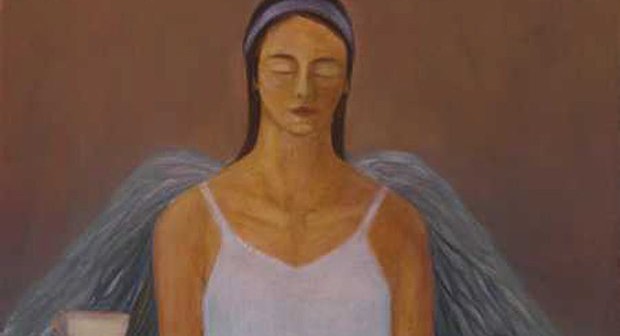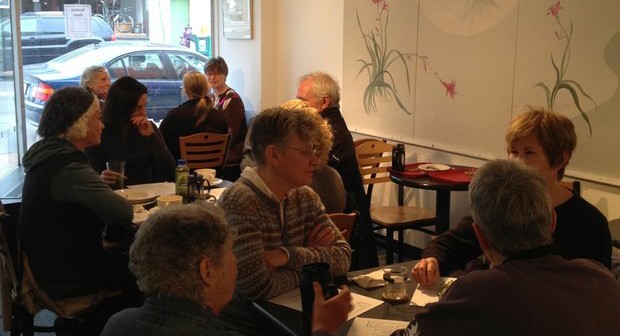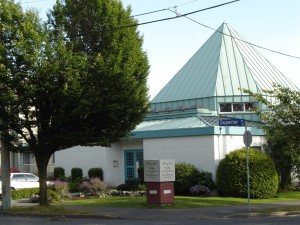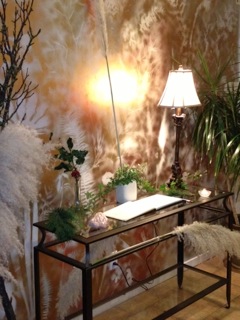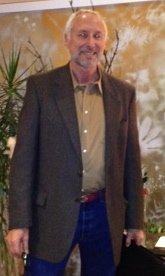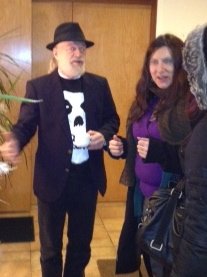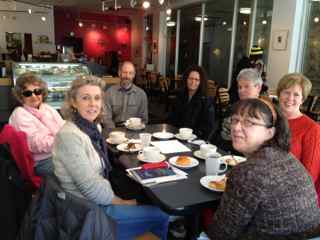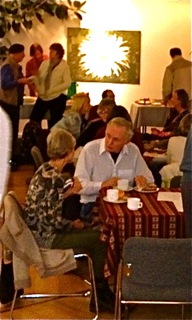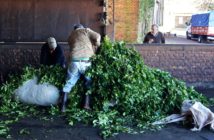A new movement is sweeping the continent, offering the opportunity for strangers and friends to gather together for tea, cake and an open discussion on what has become a very taboo subject in our Western culture: death and dying.
It is perhaps our one universal trait as human beings: the knowledge that, one day, we all will die. But what we do with that knowledge varies tremendously from person to person and culture to culture, sometimes varying greatly even among members of the same family. Personal beliefs and experiences weigh heavily on how we handle the death and dying of others and on our decisions as to how we would like our own encounters with death to play out.
[groups_member group=”Paid Subscribers”]Unfortunately, we as a society have been groomed for so long to believe that death simply isn’t a proper conversation that our thoughts on the matter are often kept secret, locked away in a place many have come to view as dark, cold and lonely; a place where there are no answers, only questions, uncertainty and, oftentimes, fear. Enter the Death Cafe.
Death Calling
It’s a concept that was already spreading in the U.K. courtesy of Jon Underwood, a father of two and a student at Jamyang Buddhist Centre in London. Underwood was inspired to host his own Death Cafe after reading of the Cafe Mortels organized by Swiss Sociologist and Anthropologist Bernard Crettaz. Underwood in turn started the DeathCafe blog where he shared news of his Death Cafes, as well as suggested guidelines for running like events developed with Sue Barsky Reid, a psychotherapist who facilitated Underwood’s cafes. That blog went on to spark Ohio native Lizzy Miles, a hospice social worker, to bring the concept to the States and, thus, the Death Cafe movement was born.
At press time, Death Cafes have popped up throughout England, the U.S., Wales, Australia, Brazil, and Canada. It’s quite a lot of progress considering the first U.K. Death Cafe happened in Underwood’s house in September 2011 and the guide to running a Death Cafe of one’s own was only published in February of 2012.
For Underwood’s part, his dedication to growing the Death Cafe movement stems from a belief that “engaging with death is both important and overlooked. My experience and instinct tell me that death can play a role in helping us enjoy life and also help us get to grips with some big challenges.” He pointed to issues like supporting older people, climate change, a broken economic system and chronic global inequality as among those that can benefit from a more compassionate, thoughtful approach to life. “If we can face up to death,” he added, “we can face up to anything, no?”
“It’s needed!” Miles said of the Death Cafe movement, adding she often sees people arrive at hospice without ever having had a conversation about their own death with their families. “It’s so needed. As soon as I heard of the Death Cafe concept I wanted to be a part of it. It’s so simple, but so needed: let’s create a place where people can talk honestly about their feelings on the subject.”
The idea of honestly and openly sharing ideas is an important tenet of the cafes. “Death Cafe has the principle of not aiming to lead people towards any particular conclusion, product or course of action,” Underwood said. “We don’t say we have any answers. Rather we offer people space to talk, listen, reflect, and draw their own conclusions.”
“I’m very neutral with the topic,” Miles said. “I try not to direct the conversation.” She noted it’s the very differences in opinions, personal rituals and experiences that makes the cafes so interesting. “People really enjoy the open environment and they especially enjoy hearing what others in the group have to say. We’ve had Catholics, Hindus, Atheists. They’re here because they want to talk about it and they share their stories and listen with respect.”
Death Settings
One thing is certain, step through the doors of one of these “cafes” and you’re in very good hands. Hosts vary from social and hospice workers to end-of-life coaches to home funeral and green burial educators and advocates. Add to that the grief counselors, medical doctors and psychiatric social workers they routinely invite to partake in the evening and, though not labeled as a therapy session, one’s varied questions and concerns will most certainly be addressed openly.
The hosts have typically come to the Death Cafe concept via their own work and research and possess distinct experience in the process, the coping and the discussion of death. They’re here to open the conversation and to help interested parties share their own experiences, hopes and fears. This is by no means a meeting of dark people in dark halls but instead an open blending of ideas and philosophies in settings meant above all else to be welcoming.
In Victoria, British Columbia, for example, Don and Liz Morris hosted Canada’s first Death Cafe in December amid pine boughs, candles and holiday lights, as well as “soft, dreamy” music courtesy of a flutist, pianist and singer/guitarist. The event also included 51 attendees proving there is indeed life in the conversation of death.
Taboo Subject/Universal Conversation
The consensus among the Death Cafe hosts is that people’s reasons for fearing death and any personal conversations about it are as varied as the people themselves. Some are afraid to discuss their feelings regarding what they might want for their own death because their wishes may differ greatly from the beliefs and practices they were taught growing up; others are afraid their fears regarding death will be ridiculed; still others that their hopes will be dashed.
“There’s this disjoint in our society,” said Merilynne Rush, a home funeral and green burial educator and advocate and host of Death Cafes in Ann Arbor, Michigan. “[Death] is universal, but we’ve institutionalized it, just like we’ve institutionalized birth. We don’t want to see it, touch it, smell it. We’ve left this hole in our lives because we took death out of our own parlors and put it in a home and let someone else deal with it.”
Morris believes there is a “dreamy aspect [to]our North American, highly westernized culture that somehow disowns death or at the least wants to forget about it.” His theory is that by ignoring death we’ve created a “black hole inside our souls,” a hole he says may be where death once had a home until we evicted it. “Death is life’s loving companion,” Morris said. “Just take a walk in nature, it’s all around us and it’s a good thing, a just and even beautiful thing at that!”
It’s important to note the hosts do not label the Death Cafe experience as a substitute for professional therapy of any kind. “I do not advocate Death Cafe as a therapeutic setting or methodology,” said Linda Siniard, host of the Death Cafe in Sonoma, California. “But it’s likely to have therapeutic effects for those who have survived the ‘black pit’ or ‘white heat’ of grief.”
“It’s a space for gaining positive, life giving, death awareness,” Morris said. “There was so much sociability and conviviality. It was a friendly, safe, communal cauldron of loving energies.”
Targeted Audiences
Though death itself is indeed universal, and the Death Cafes welcome anyone and everyone, a need was recognized in both the U.S. and the U.K. to offer cafes that specifically addressed the LGBT community.
“The first Death Cafe in the U.S. happened in the town where I grew up,” said Lori Gum, program coordinator for Stonewall Columbus, an LGBT community center in Columbus, Ohio. “I personally was very interested and decided to go and loved it. Culturally and entertainment-wise, death is all around us, but we’ve really never been more disconnected from it.”
The cafe in question, Miles’ first, happened to take place just after the first LGBT Death Cafe in Europe. Gum spoke with Miles after the event and the two decided to co-host a Death Cafe at Stonewall, one that would welcome everyone, but allow for emphasis on the LGBT community.
“We decided it would be more productive to have our own Death Cafe because, unfortunately, the LGBT community has had a very intimate relationship with death,” Gum said. “The older generations went through AIDS and there’s a lot of suicide in our community.”
Gum said that while straight allies are “absolutely welcome,” the idea was to create a “very open, warm environment. People don’t have to worry that someone there may have an issue with their sexual orientation and you need that freedom of expression.”
The event was such a success that future Death Cafes are already in the works at Stonewall.
Life After Death (Cafes)
“My primary hope for the participants is that they will find a comfortable and safe setting in which to discuss their hopes, dreams and fears about the subjects of dying and death in an atmosphere free from judgment, criticism, and proselytizing and with a sense of community,” Siniard said.
Morris echoed those thoughts, adding he “would be very happy if this helped people reflect on what is really important to them in their life and focus a bit more on this.”
And it would seem attendees do indeed find the Death Cafe to be a place steeped in safety and acceptance, coupled with a camaraderie created by the group’s shared curiosity about the subject at hand.
“As a society we have been negligent in discussing death,” said Hani Hara, an artist and salesman who attended a Death Cafe in Columbus, Ohio. “Death, how to approach it, how to deal with it when someone close is dying, the different philosophies around the world, etc.”
Hara said the idea of a discussion group organized to pursue the conversation of death was very intriguing. “I enjoy the discussion on the subject and how people approach the subject,” Hara said, adding, “The one thing I took away from the event is how much this is needed to someone who is dying or has lost someone recently.”
And people like Gum, who began as attendees and have gone on to host Death Cafes of their own understand perfectly how effective a cafe can be. “When everyone left, you felt like you had known them for years,” Gum said of the sessions she has participated in thus far. “Everyone was respectful and interested. Everyone had a sense of humor. People want to come back.”
And that’s all Underwood, Miles and all those who are now following in their footsteps were hoping for: an opportunity to open up the conversation about death and the right vehicle to keep that conversation going.
Resources:
[/groups_member]
[groups_non_member group=”Paid Subscribers”]
Want to read more?
You need a subscription to view the full article – click here to subscribe!
[/groups_non_member]

